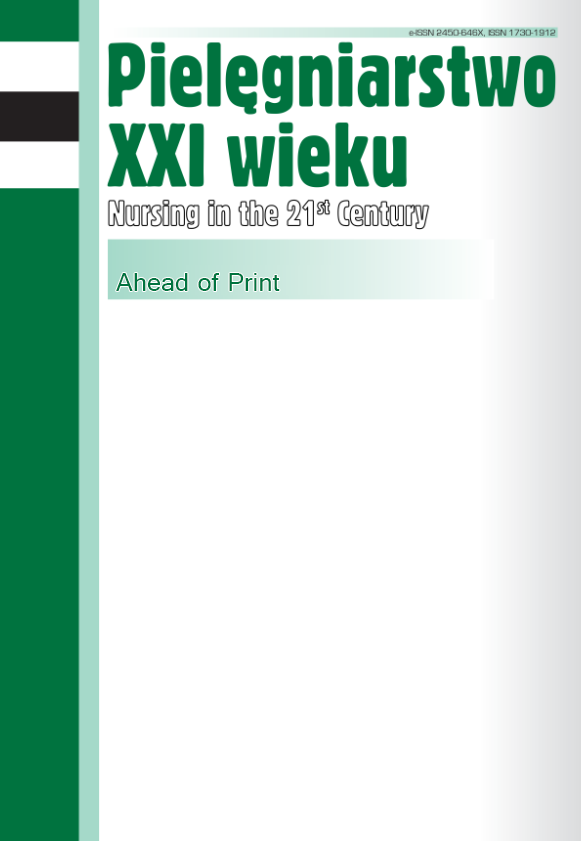Sleep procrastination in the context of electronic device overuse as a contemporary public health threat
DOI:
https://doi.org/10.12923/pielxxiw-2025-0020Keywords:
sleep, public health, procrastination, electronics, sleep procrastinationAbstract
Aim. The aim of the study was to analyse health-related behaviors associated with sleep procrastination and electronic device usage in the context of their relationship with the self-assessed health and sleep quality of the participants.
Material and methods. The study was conducted on a group of 555 adults using a custom-designed questionnaire distributed electronically, along with the standardised tool Pure Procrastination Scale.
Results. Participants who declared sleep procrastination reported significantly lower levels of self-assessed general health (p=0.000), self-assessed sleep quality and feeling well-rested (p=0.000), physical activity levels (p=0.000), self-assessed healthy eating habits (p=0.000), and overall procrastination (p=0.000). However, sleep procrastination was not associated with the participants’ age (p=0.08).
Conclusions. The available scientific literature highlights the negative impact of electronic device usage before bedtime on sleep quality, sleep duration, and overall health. Sleep procrastination itself is associated with serious health issues. The scale of this phenomenon, as indicated by the study findings, underscores the need for increased educational efforts to limit harmful electronic device usage and to recognize sleep procrastination as a significant public health concern.
References
1. Beutel ME, Klein EM, Aufenanger, et.al. Procrastination, Distress and Life Satisfaction across the Age Range - A German Representative Community Study. PloS one. 2016; 11(2), e0148054. https://doi.org/10.1371/journal.pone.0148054
2. Huh H, Kwon S. A critical review of definition, classification, and measurement of procrastination. The Korean Journal of Psychology. 2022; 41(1):1-37. https://doi.org/10.22257/kjp.2022.3.41.1.1
3. Brinkman JE, Reddy V, Sharma S. Physiology of sleep. [in:] Stat Pearls [Internet]. Treasure Island (FL): Stat Pearls Publishing; 2023. https://www.ncbi.nlm.nih.gov/books/NBK482512/
4. Hill VM, Rebar AL, Ferguson SA, et al. Go to bed! A systematic review and meta-analysis of bedtime procrastination correlates and sleep outcomes. Sleep Med. Rev. 2022; 66: 101697. https://doi.org/10.1016/j.smrv.2022.101697
5. Xiaohan M, Dexin M, Liwei Z, et al. Bedtime procrastination predicts the prevalence and severity of poor sleep quality of Chinese undergraduate students. J. Am. Coll. Health. 2022; 70(4): 1104-1111. https://doi.org/10.1080/07448481.2020.1785474
6. Fagiani F, Di Marino D, Romagnoli A, et al. Molecular regulations of circadian rhythm and implications for physiology and diseases. Sig. Transduct. Target Ther. 2022; 7:41. https://doi.org/10.1038/s41392-022-00899-y
7. Share of mobile phone and smartphone users in Poland from 2015 to 2021. https:// www.statista.com/statistics/1270803/poland-share-of-mobile-phone-and¬smartphone-users/; 2024-10-01
8. Children’s internet usage in Poland - Statistics & Facts. https://www.statista.com/ topics/5611/children-s-internet-usage-in-poland/#topicOverview; 2024-10-01
9. Steel P. The nature of procrastination: A meta-analytic and theoretical review of quintessential self-regulatory failure. Psychol. Bull. 2007; 133(1): 65-94. https://doi.org/10.1037/0033-2909.133.1.65
10. Zhang S, Liu P, Feng T. To do it now or later: The cognitive mechanisms and neural substrates underlying procrastination. WIREs Cogn. Sci. 2019; 10:e1492. https://doi.org/10.1002/wcs.1492
11. Kroese FM, De Ridder DTD, Evers C, et al. Bedtime procrastination: introducing a new area of procrastination. Front. Psychol. 2014; 5: 1-8. https://doi.org/10.3389/fpsyg.2014.00611
12. Sun JCh, Hyeyoung A, Sooyeon S. What do people do before going to bed? A study of bedtime procrastination using time use surveys, Sleep. 2020; 43(4): zsz267. https://doi.org/10.1093/sleep/zsz267
13. Shatz I. Bedtime Procrastination: Why people procrastinate on going to bed and how to stop. solvingprocrastination.com. Access: 2024-10-12
14. Adeoye AO, Jegede AS. Use of digital social media at night, awareness of its effect on sleep, potential risks and factors driving the behaviour. J Public Health (Berl.). 2024; 32, 103–109. https://doi.org/10.1007/s10389-022-01794-0
15. Hamvai C, Kiss H, Vörös H, et al. Association between impulsivity and cognitive capacity decrease is mediated by smartphone addiction, academic procrastination, bedtime procrastination, sleep insufficiency and daytime fatigue among medical students: a path analysis. BMC Med. Educ. 2023; 23(1): 537. https://doi.org/10.1186/s12909-023-04522-8
16. Yang Z, Huang J, Li Z, et al. The effect of smartphone addiction on the relationship between psychological stress reaction and bedtime procrastination in young adults during the COVID-19 pandemic. BMC psychiatry 2023; 23(1): 813. https://doi.org/10.1186/s12888-023-05276-9
17. Rubin R. Matters of the Mind-Bedtime Procrastination, Relaxation-Induced Anxiety, Lonely Tweeters. JAMA. 2020; 323(1):15-16. https://doi.org/10.1001/jama.2019.20014
18. Zhou B, Mui LG, Li J, et al. A model for risk factors harms and of smartphone addiction among nursing students: A scoping review. Nurse Educ. Pract. 2024; 75: 103874. https://doi.org/10.1016/j.nepr.2024.103874
19. Geng Y, Gu J, Wang J, et al. Smartphone addiction and depression, anxiety: The role of bedtime procrastination and self-control. J. Affect. Disord. 2021; 293: 415-421. https://doi.org/10.1016/j.jad.2021.06.062
20. Magalhães P, Cruz V, Teixeira S, et al. An exploratory study on sleep procrastination: bedtime vs. while-in-bed procrastination. Int. J. Environ. Res. Public Health. 2020; 17(16): 5892. https://doi.org/10.3390/ijerph17165892
Downloads
Published
Versions
- 2025-06-18 (2)
- 2025-06-18 (1)
Issue
Section
License
Copyright (c) 2025 Sebastian Chudziak, Bartłomiej Drop (Autor)

This work is licensed under a Creative Commons Attribution 4.0 International License.




